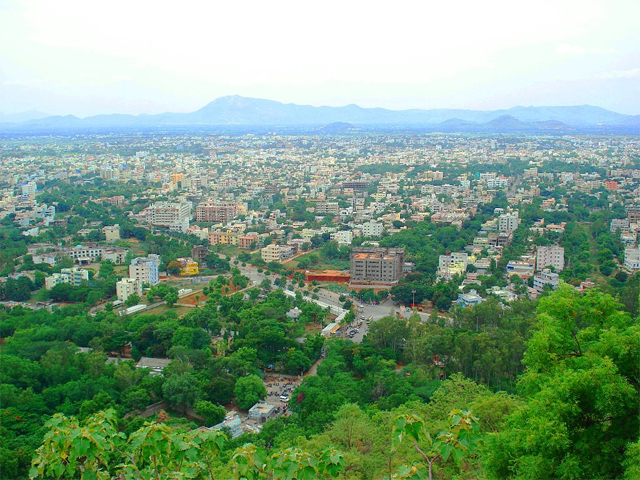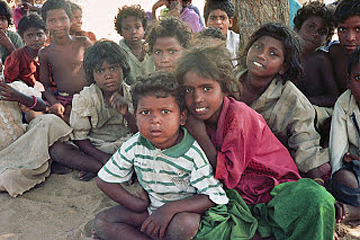News sources in India reported last week that the famous actor who goes by the stage name Chiranjeevi has once again taken an interest in the Yanadi. When he temporarily gave up his acting and entered politics ten years ago, his political career became mixed in with the relatively obscure tribal group in Andhra Pradesh. The interest in the story is in the way aspiring politicians and other prominent individuals sometimes use poor people—such as the Yanadi in this case—for their own cynical advantage.

After many years of acting, numerous awards, and nearly 150 films, many of which were major hits, Chiranjeevi has become a superstar of the Indian cinema. But he decided in 2007 to dial back his acting career and go into politics. He founded a new political party in Andhra Pradesh called the Raja Rajyam, with an agenda calling for better social justice programs.
His connection with the Yanadi people began during the campaigning in 2008 when a dynamic Yanadi woman named Tupakula Munemma, a 30-year old laborer from the Nellore District, gave an impassioned speech during a rally for women’s rights. A forceful campaigner against alcoholism, her speech urging women to take action to solve their problems themselves electrified the crowd.
Chiranjeevi quickly convinced her to run for a seat in the assembly herself. News accounts later that year accorded her with a status not far behind the superstar turned politician. She was the first candidate the actor chose to run for a district seat in Nellore. The party continued to tout its support for the so-called Backward Classes of Indian society and even a week before the 2009 election, Raja Rajyam was promoting its support for the Yanadi and the other inhabitants at the bottom of India’s stratified society.
Chiranjeevi won a seat in the election of 2009 to the state legislative assembly from Tirupati, a city of 287,000 in the Chittoor District. His new party only received 18 out of 295 seats in the assembly, however, so he did not become the Chief Minister as he had hoped.
Not much more than a year later, in August 2010, the newly elected politician was quoted in the press as having forgotten his young Yanadi supporter, Ms. Munemma. Someone asked him why he was not encouraging aspiring leaders from the lowest rungs of society such as the Yanadi woman he had championed two years before. He couldn’t remember her.

Things went downhill from there between the Yanadi and their former champion. In August 2011, still serving as a member of the state legislative assembly from Tirupati, he decided to pay a visit to some of the poor members of his district. He visited the Yanadi Colony in the city—the fourth such visit—but this time he was mobbed by a crowd of angry women who charged that he had made lots of promises as a champion of the poor in order to get elected but so far he had not carried through on them. Nothing had been improved. The leader of the protesters was particularly critical of their inadequate drinking water supply. She charged that he only visited the Yanadi to gain publicity. He left in a huff. But he did announce subsequently that he was trying to address the water problems with the Chief Minister of the state.
Chiranjeevi left the local political scene early in 2012. He ran for, and was elected to, the upper house of the Indian national parliament, the Rajya Sabha, in which he still serves. But he had been losing interest in politics and decided to return to his acting career. The recent success of his 150th film has re-engaged him in acting and reduced his involvement in politics still farther. Or so it has seemed to observers in India.
But the story of Chiranjeevi’s relations with the Yanadi entered the news again last week when the politician/actor wrote a letter to the Chief Minister of Andhra Pradesh, N. Chandrababu Naidu, complaining about the treatment of the Yanadi colony in Tirupati. He alleged, according to one account , that Tirupati wanted to evict the Yanadi scavengers from their 2.34 acres of land and give the property to other private interests.

“Though the government is saying that they would be rehabilitated elsewhere, it is nothing but an attempt to drive them away from the town,” he wrote in his letter. He argued that the government of Tirupati was discriminating against the scavengers. He said that the colony should be given up-to-date facilities and developed into a modern community.
Chiranjeevi stated that he had tried to bring some developments to the Yanadi when he was the representative to the state legislature. His points were picked up by other news sources on Monday which provided similar reports—that he had emphasized the injustice of discriminating against the long-term resident Yanadi scavengers in the city.